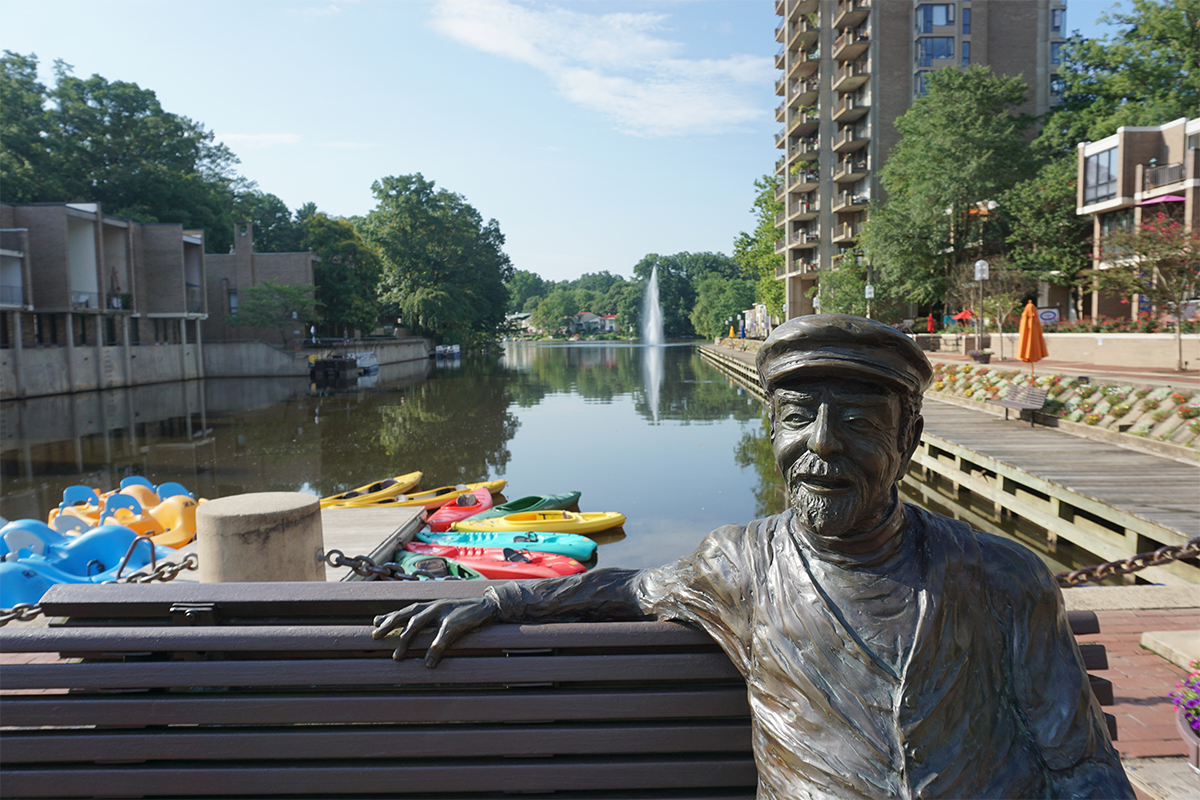
It’s 9 o’clock on a Saturday. The regular crowd shuffles in. There’s an old man sitting next to me. His name is Jay Angoff, and he’s relaying an anecdote that encapsulates his unique life story at the intersection of politics and music.
“This pretty young girl started telling me inbetween songs how much she loved my political ideas. I was impressed that she knew all about my work for the FTC’s antitrust department and helping craft Affordable Care Act regulations,” says Angoff, 66. “She came back the next week and apologized, explaining that she thought I was Bernie Sanders.”
A regular Saturday night performer at Georgetown Piano Bar, the white-haired Angoff looks a bit like Sen. Sanders if he occasionally used a comb. Angoff specializes in performing songs that would be least expected from somebody wearing a tuxedo, with the biggest applause on this night coming after he raps the entirety of “Gangsta’s Paradise”—from memory.
Located just over the Key Bridge from Rosslyn, Georgetown Piano Bar brings music to the town of politics. Framed photos on the walls show JFK sharing a glass of wine with Old Blue Eyes, Reagan shaking hands with the King of Pop, and Bill Clinton laughing with The Boss. Fittingly, Angoff’s life has similarly melded the worlds of music and politics, at a level few others have so successfully straddled, except maybe Sonny Bono—and possibly Kanye West in 2020.
Every Saturday night, Angoff dons a tuxedo to play piano and sing until 3 a.m. as one of the two regular “dueling pianos” performers. On weekends when the weather is clear, patrons can routinely number 150, packed almost shoulder-to-shoulder in the venue.
Though their ages range from Georgetown University students out on the town to baby boomers relaxing after a tough workday, they’re all young at heart. During certain songs Angoff performs, everybody joins in regardless of birth year: the “Ba ba baaaaaaa” on “Sweet Caroline,” the “Sha la la la la” on “Brown Eyed Girl,” the “Ahhhh … Ahhhhhh … ” as the crescendo builds in “Twist and Shout.”
Yet only people under a certain age join in during some of Angoff’s more unusual selections. He plays the modern hit “Stacy’s Mom” by Fountains of Wayne, even though Stacy’s mom is about 25 years too young for him. He performs Lady Gaga’s electro-pop “Bad Romance.” He sings Bryan Adams’ “Summer of ’69.” Plus he has, for some reason, committed to memory rap lyrics by Coolio that read, in part: “You better watch how you talkin’ and where you walkin’ / Or you and your homies might be lined in chalk / I really hate to trip, but I gotta lock / As they croak, I see myself in the pistol smoke.”
Don’t judge a book by its cover. “The stereotype is that people my age think there’s been no good music since 1974. But there was good music in the ’80s, the ’90s, the 2000s,” Angoff says. “We play what people want to hear on a Saturday night. It’s not about you, it’s about the audience. I love ‘The Weight’ by The Band, but it’s not great to dance to. If people ask for ‘Baby Got Back,’ I’ll play that.” He pauses and then adds, “Although I won’t play ‘Dick in a Box.’”
He’s not kidding. “A guy once offered $200 to play a song. I didn’t know it. So I went outside for a few minutes and played it on my iPad. I refused to perform it,” Angoff confesses. “‘Baby Got Back’ is the 23rd Psalm compared to ‘Gimme That Nut’ by Eazy-E. We would probably be arrested.”
Playing piano and guitar from an early age, Angoff’s first gig was with his eighth grade band performing behind the meat counter at the opening of a Pathmark grocery store. “Our band was called The Establishment. It was supposed to be ironic because we were anti-establishment,” he recalls. Most people didn’t get it.
Angoff grew up in Clifton, New Jersey, one of several towns where the HBO mob drama The Sopranos took place. (He’s seen every episode.) His biggest musical influences included jazz and rock pianists Richard Tee, Dr. John, Allen Toussaint and Oscar Peterson.
Attending Oberlin College in Ohio, Angoff was roommates with Jerry Greenfield, one-half of the famous ice cream duo Ben & Jerry’s. In fact, it was during their senior year in 1972 that Greenfield introduced Angoff to a woman named Kerry who attended Skidmore College. They celebrated their 30th wedding anniversary last year, and Greenfield personally catered the ice cream for their wedding. And for those doing the mental math: they got married a full 15 years after they first met.
Shortly before graduating, Angoff got accepted into law school, but decided not to immediately attend in order to pursue his musical dreams. There he was: armed with that most valuable of degrees, an undergraduate in philosophy, but not attending law school so that he could try making it in rock ’n’ roll. “Needless to say,” Angoff remembers, “my parents hated it.”
At first he played with Elliott Murphy, a rising star at the time whose debut 1973 album Aquashow drew rave reviews from Rolling Stone calling him “sensational” and “the next Bob Dylan.” Angoff played piano for Murphy’s touring band, which opened for Billy Joel, Aerosmith, The Kinks and Jefferson Starship.
“We got along with all the bands except Aerosmith. We thought they were total jerks and completely without talent. One time we even almost got into a physical fight with them,” Angoff remembers. “We were stunned when they became as big as they did.”
Then Angoff played in the touring band for the group Brooklyn Bridge, which sold more than 10 million records and released the hit “The Worst That Could Happen” which reached No. 3 on the Billboard charts. He even performed with them during a gig at Madison Square Garden.
But after two years he decided it was time to leave that whole scene, at least as a full-time venture. “[Jefferson Airplane guitarist] Paul Kantner was once talking to me backstage and warned me not to stay around the music business as long as he had,” Angoff says.
Plus, Angoff had gotten tired of performing with some mediocre groups. “I also played in a show band that played Holiday Inns and Ramada Inns and Mafia rooms,” Angoff says. “We were so bad that we once had a weeklong gig at a place in Pennsylvania, and after we played the first night the owner paid us not to play.”
Angoff enrolled in Vanderbilt University Law School in Tennessee, where he pursued a specialization in antitrust law. “Too much power in the hands of too few is bad for the people and bad for the country,” he explains of his philosophy both then and now.
He found work at the Federal Trade Commission, assisting on merger cases under Chair Mike Pertschuk during President Jimmy Carter’s administration. But Angoff quit upon the election of President Ronald Reagan, whose deregulatory approach he believed kickstarted a decades-long trend of “too many administrations—both Democratic and Republican alike— approving too many mergers.”
So he went to work for consumer advocate Ralph Nader at the organization Congress Watch. “People these days mostly think of Nader as that old guy who won’t stop running for president and possibly handed the election to George W. Bush. But in those days he was a true cutting-edge revolutionary,” Angoff says. His responsibilities included lobbying Congress for consumer protections and writing op-eds published under his own byline in The Washington Post, New York Times and The Wall Street Journal.
In addition to such writings, he wasn’t immune to publicity-seeking tactics. One notable example regarded the FTC’s used-car rule, which originally required automotive dealers to disclose known defects. Congress vetoed the proposed rule in 1982, the first time they had ever nullified an FTC rule in its decades-long history, so the FTC pared back its rule. Angoff helped set up a bogus used-car lot in front of FTC headquarters to denounce the move.
By the 1990s, Angoff was director of the Missouri Department of Insurance, but he didn’t cease his music entirely. Singer Chuck Berry would utilize a different piano player and drummer in each city he toured in, and, through mutual friends, Angoff secured a spot for years as the pianist for Berry’s Missouri concerts.
“Chuck would sneak extra measures into songs and randomly change keys. He wouldn’t even have a prepared set list, instead he would just decide which song he wanted to play next and yell it out to everyone else on stage,” Angoff says with a laugh. “And he could still do the duck walk, even in his 70s.”
Angoff arrived in the Washington, D.C., area in 2009, right as the biggest public policy fight of the decade was brewing.
Former President Barack Obama was attempting to engineer the biggest reform of the U.S. health care system since the 1960s. Critics on the right lambasted the legislation as a price-surging and freedom-destroying governmental power grab. The furious left criticized the failed shot at universal health care during the best opportunity Democrats ever had. Citizens across the country showed up with guns when Congress members held town halls on the subject. Former Alaskan governor and candidate for vice president Sarah Palin and others claimed the bill would establish “death panels.” The Supreme Court appeared potentially poised to strike the whole thing down as unconstitutional even if it passed.
The law eventually enacted in March 2010 granted significant powers to the Department of Health and Human Services, then headed by Secretary Kathleen Sebelius. She had served as insurance director for Kansas back in the ’90s when Angoff held the same position for neighboring state Missouri. So Sebelius appointed him to one of the most powerful positions in the entire department.
As the newly created director of the Office of Consumer Information and Insurance Oversight, Angoff’s job was essentially to craft and implement specific official rules and regulations based on many of the health care law’s general principles. In practice, that meant Angoff was in charge of crafting the policy specifics for five or six rules collectively known as the Patient’s Bill of Rights, which have become among the most well-recognized elements of the law. These include:
• Children being able to stay on their parents’ insurance until age 26.
• No annual or lifetime limits.
• No rescission of coverage.
• Companies have to spend at least 80 cents of every premium dollar on care.
• All rate increases must be reviewed by states’ insurance departments if a state has the mechanism to do it, as most states do.
“I have known Jay Angoff for years, since we served together as insurance commissioners and shared a large bi-state Kansas City market,” says Sebelius, now president and CEO of the consulting firm Sebelius Resources LLC. “He taught me about looking out for consumers and making sure that companies had appropriate regulatory oversight.
“Years later, Jay agreed to come into HHS to build a regulatory team at the federal level, and I knew he had the right expertise and instincts to develop a platform where consumers got the protections they deserved and companies had clarity and certainty about the rules of the new national marketplace,” Sebelius continues. “That framework he developed resulted in millions of Americans enrolled in health insurance in the individual market across the country.”
Angoff faced his fair share of critics. Many conservatives claim that problems associated with modern health care—including skyrocketing costs and insurers dropping patients—are partially due to regulations and rules of the sort he spent a lifetime promulgating at both the state and federal levels.
“Angoff’s tenure in both Missouri and New Jersey is associated with driving out health insurers and driving premiums sky high,” conservative commentator and vice president of the Center for Medicine in the Public Interest Robert M. Goldberg wrote for The American Spectator. “As a result, since 1993, New Jersey’s insurance premiums have increased faster and are the most expensive in the country.”
How does Angoff respond to criticisms that the entire Affordable Care Act law was a federal power grab? “That couldn’t be further from the truth,” Angoff retorts. “The federal government bent over backwards to authorize states to take control.” He cites the examples of health insurance exchanges residing at the state rather than federal level, plus the lack of a federally run public option from the final law.
Angoff’s reasoning hasn’t found support from much of the American public. To what does he attribute the law’s backlash, at levels unparalleled in the last few decades? “It’s easier to be against something than for something,” Angoff says. “Some people at town halls complaining about Obamacare in 2009 are now the same exact people arguing for it at town halls now. It’s harder to take benefits away from people once they already have them.”
Still, even as the Republican repeal efforts thus far have fallen short in the Senate, opposition was, and remains, fierce in some quarters. Angoff recalls one particularly heated meeting with most of the 50 state insurance commissioners.
“One of them started haranguing Obama at a level I couldn’t believe. I had never seen such a level of disrespect towards any president of either party,” he says. The nascent Tea Party was gaining steam at that time, in large part due to right-wing acrimony toward health care reform. Angoff wouldn’t disclose the commissioner’s identity, but did disclose that the commissioner hailed from a southern state.
Angoff met Obama personally several times, refusing to divulge the content of most of their confidential conversations and debates, but noting that “Obama was taller than you’d think.” (Obama is 6’1”) Angoff reveals the best advice he got for dealing with the president: “One political person [in the Obama Administration] told me to never suggest that another nation does something, anything, better than the U.S.A.”
Angoff returned to private practice in 2012, as a class-action litigator and consumer advocate at the law firm Mehri & Skalet, primarily focusing on health care and insurance issues. The office Angoff previously led has since been folded into the Centers for Medicare and Medicaid Services. Under the Trump Administration the office is run by Randy Pate, who declined through a CMS spokesperson to be interviewed for this article.
One night Angoff walked into the since-shuttered piano bar Mr. Smith’s of Georgetown and asked for permission to play a few songs, eventually becoming one of their regulars. After its closure, he transferred over to Georgetown Piano Bar, co-founded by a few former Mr. Smith’s employees. He now performs every Saturday night at their 3287 M St. NW location.
Georgetown Piano Bar is a special place, a literal underground hangout featuring drink specials named after prominent musicians: the Willie Nelson (vodka with lime juice, ginger beer and mint), the Louis Armstrong (spiced rum and Patron Citrónge with pineapple juice and an orange slice) and the Alicia Keys (dark rum with ginger beer).
“I have always considered Jay to be the modern day, intelligent version of Forrest Gump. His life experiences are so unique, I find myself craving any anecdote he will give me,” says Hunter Lang, 27, the other Saturday night dueling piano player who performs alongside Angoff. “But that can be difficult at times since he is the most humble human being I have ever met.
“I have the pleasure of spending six hours with him every Saturday while we perform. He is one of the most remarkably talented players I have ever come across,” Lang continues. “Not only can he knock out any piano solo better than the original, he has also found his calling with hip-hop and rap. Hundreds are entertained every week as he goes from playing The Beatles to rapping Blackstreet without missing a syllable or a beat.”
It’s a different crowd every time, and on one summer night a group from the British Embassy mixes in with the gathering audience. Angoff commences by playing the opening piano riff to “Will It Go Round In Circles” by his adolescent musical idol Billy Preston. A few people let out wolf whistles. A couple starts dancing. Somebody powers up the disco ball in the corner.
They say, “Sing us a song, you’re the piano man … ”




